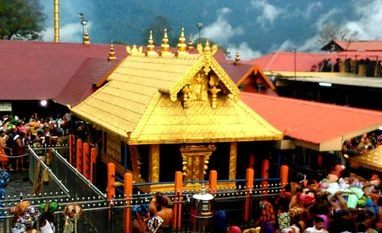The Supreme Court is scheduled to consider on Tuesday a batch of petitions seeking review of its September 28 verdict allowing entry of women of all age groups into the Sabarimala temple in Kerala.
On September 28, a five-judge constitution bench headed by then Chief Justice Dipak Misra, in its 4:1 verdict, had paved the way for entry of women of all ages into the Sabarimala temple saying that the ban amounted to gender discrimination.
A batch of 48 petitions seeking review of the judgement would be taken up for consideration in-chamber by a bench of Chief Justice Ranjan Gogoi and Justices R F Nariman, A M Khanwilkar, D Y Chandrachud and Indu Malhotra.
Besides these pleas, three separate petitions seeking review of the verdict are also slated to come up for hearing in the open court before a bench comprising CJI Gogoi and Justices Sanjay Kishan Kaul and K M Joseph.
The apex court's judgement has led to protests and counter-protests at the hill-top shrine in Kerala.
The top court had on October 9 declined an urgent hearing on the review plea filed by an association which had contended that the five-judge Constitution bench's verdict lifting the ban was "absolutely untenable and irrational".
Later, the court had said that it would consider the review pleas on November 13.
More From This Section
A plea filed by National Ayyappa Devotees Association (NADA), which has sought review of the verdict, had said that "the notion that the judgment under review is revolutionary, one which removes the stigma or the concept of dirt or pollution associated with menstruation, is unfounded. It is a judgment welcomed by hypocrites who were aspiring for media headlines. On the merits of the case, as well, the said judgment is absolutely untenable and irrational, if not perverse".
Besides the Association, several other petitions including one by Nair Service Society (NSS), have been filed against the apex court verdict.
The NSS had said in the plea that as the deity is a 'Naistika Brahmachari', females below the age of 10 and after the age of 50 years are eligible to worship him and there is no practice of excluding worship by females.
"Hence, the delay or wait for 40 years to worship cannot be considered as exclusionary and it is an error of law on the face of the judgement," the plea had said.
)